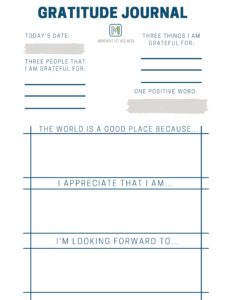August 2020 Wellness
By Myriah Shimatsu, Owner, Movement 1st Wellness
Mindfulness is quietly noticing what is happening in the present moment, without passing judgement. A mindful individual is not constantly reflecting on the past or fretting about the future; he/she is simply being in the present. And while thoughts of the past and future are unavoidable, making an effort to stop and smell the roses (literally and figuratively) provide you with an appreciation of your surroundings and the opportunity to see the positive aspects of your situation.
Do you practice mindfulness or gratitude? Have you ever thought of the benefits of having a mindful workplace?
Let’s look at benefits, you may already know, that can occur from being grateful or practicing mindfulness.
- Decreased Stress: Mindfulness can help relieve stress by improving emotion regulation, leading to an improved mood and greater ability to manage stress.
- Enhanced Ability to Deal with Illness: Mindfulness can help individuals focus less on the illness or symptoms, if chronically sick. Mindfulness can help us make better decisions in living a healthier lifestyle and, thus, improving quality of life.
- Facilitation of Recovery: Mindfulness can help individuals cope or recover from a chronic illness, life threating event or addiction.
- Decreased Depression: Mindfulness can help an individual feel less anxious or depressed. Mindfulness has also been recognized as an effective tool for even the most chronic symptoms, such as thoughts of suicide.
- Improved General Health: Mindfulness can enhance various behaviors related to improved health such as better decision making and regulation of emotions.
(Positive Psychology, 2020)
Mindfulness has a huge impact on our cognitive development and resilience, which in turn allows for many of these other benefits to be available. When we practice mindfulness, we are conveying the message to our brain that we are more operational at dealing with everyday tasks when we are present, observant, and non-judgmental (Positive Psychology, 2020). Meditation practices specifically have been associated with an improved thickness in the cortex of the brain, an area responsible for responsiveness and sensory processing.
Mindfulness has a direct correlation to the workplace and an individual’s performance and job satisfaction. Currently, 60%-90% of healthcare spending is for stress-related conditions (Benson Henry Institute). High levels of stress develop poor physical health (fatigue, aches and pains, weight gain) and compromised mental health (depression, anxiety, anger). 31% of workers say they are “often or very often stressed at work” (Forbes, 2019). Depression and anxiety are the number one reasons individuals take sick days. Studies show 61% of employees are burnt out on the job (Forbes, 2019). Stress and burnout are the main reasons why employee’s leave their jobs.
Living a mindful life or creating a mindful workplace has many benefits for the individual and organization. How do you cope with stress? How do each of your team members cope with stress? Is your team grateful? Does your team have empathy for one another? Are they mindful of their actions with one another and with patients?
Mindfulness in the office also incorporates being able to recognize internal and external stimuli that may affect us in being present (Hyland et al., 2015). Being mindful is about identifying and recognizing the stimuli and being open to accept it. Thus, a mindful person or employee will be able to take in a situation around them and not react to it, by taking in the information and responding to it with a non-judgmental solution—keeping stress low. Mindfulness plays an active role in boosting engagement and reducing burnout (Hyland et al., 2015).
Mindfulness practices are also very important to help individuals cope with change (Hyland et al., 2015). During this fluid time of COVID-19, it is important to be able to approach each day with an open mind and heart. Coping with change in a workplace requires employees to adapt to the lack of control around a certain situation. Mindfulness allows employees to decrease stress due to lack of job control that often occurs during organization or standard changes (Hyland et al., 2015).
Many benefits can be gained from practicing mindfulness and gratitude, but there is one big caveat: to receive maximum benefits, mindfulness must truly be a regular practice. The practice does not necessarily have to be long or formal—just 10 minutes a day is all you need to reap the cognitive and self-regulation benefits (Positive Psychology, 2020). Mindfulness can come in many forms like meditation, prayer, yoga, Tai-chi and even just being still and deep breathing. Find a practice that fits into your lifestyle and start reaping the benefits.
References
Hyland, P. K., Lee, R. A., & Mills, M. J. (2015). Mindfulness at work: A new approach to improving individual and organizational performance. Industrial and Organizational Psychology, 8. 576 – 602. doi: 10.1017/iop.2015.41.
Beheshti, N. (2019). 10 timely statistics about the connect between employee engagement and wellness. Retrieved from: Forbes.
Benson Henry Institute. Retrieved from: bensonhenryinstitute.org.
Ackerman, C. (2020). 23 Amazing health benefits of mindfulness for body and brain. Retrieved from: positivepsychology.com/benefits-of-mindfulness/.


